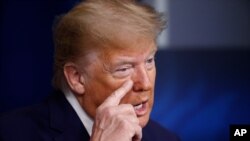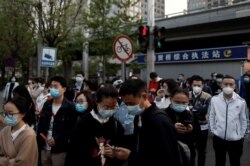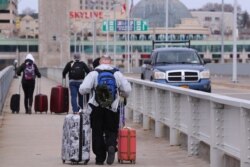President Donald Trump said Saturday that several U.S. states would begin next week opening some businesses while observing coronavirus-related precautions.
Texas and Vermont will allow certain businesses to reopen Monday, with Montana beginning on Friday, Trump said during a coronavirus briefing at the White House.
"We continue to see a number of positive signs that the virus has passed its peak," he said, adding, "Our testing is getting better and better," although he offered no concrete evidence.
Other states’ governors, however, have warned they will not act prematurely to reopen their economies until there is more testing so as not to increase coronavirus infections.
Hundreds of people in several cities around the country have protested against the lockdown measures put in place to limit the spread of the coronavirus. The protesters are angry at the economic cost of the confinement orders.
Trump also said during the briefing that China could face unspecified consequences if it was "knowingly responsible" for the coronavirus. The administration has said it doesn't rule out that the novel coronavirus was spread — accidentally — from a laboratory researching bats in Wuhan, where the outbreak began late last year.
Chinese Foreign Ministry spokesman Zhao Lijian, however, has rejected U.S. media reports on the subject, saying there is "no scientific basis" for the assertion. He has previously alleged that the U.S. military may have brought the virus into China.
Research is still evolving, but the leading theory is that infection among humans began at an animal market in Wuhan, probably from an animal that got the virus from a bat.
U.S., China at odds
Washington and Beijing have repeatedly clashed over the virus. While Trump praised the Chinese response to the virus at first, he and other high-level U.S. officials have since become more critical, sometimes calling the pathogen the "Chinese virus." They also have shot back at Chinese efforts to link the U.S. military to the virus' origin.
The president's critics in the U.S. say that although China still must be more forthcoming about how it has fared against the new coronavirus, he is now trying to use Beijing to distract from missteps his own administration has made.
Meanwhile, a group of 13 countries called Saturday for global cooperation to reduce the economic impact of the coronavirus pandemic, as infections and fatalities continued to climb worldwide.
The countries said in a joint statement that “it is vital that we work together to save lives and livelihoods.” They vowed to “work with all countries to coordinate on public health, travel, trade, [and] economic and financial measures in order to minimize disruptions and recover stronger.”
Members of the group were Britain, Indonesia, Germany, Singapore, Turkey, Canada, Italy, Brazil, France, Mexico, South Korea, Morocco and Peru.
Early signs that restrictions to contain the outbreak in Europe are working have prompted authorities in Spain and France to begin dismantling some field hospitals.
Most governments and public health officials, however, continue to caution against lifting restrictions, despite the economic toll they are inflicting on world economies.
Canadian Prime Minister Justin Trudeau said Saturday that the border his country shares with the U.S. would be closed to nonessential travel for another month as a border agreement between the nations was set to expire next week.
In the hard-hit U.S., where the debate about relaxing the restrictions has taken on partisan tones before the November presidential election, Trump is pushing to lift restrictions on businesses and workers, despite the country’s status as the world leader in confirmed cases and fatalities.
Trump called on supporters Friday who participated in street demonstrations to “liberate” three states led by Democratic governors. Demonstrations organized by conservative groups to more quickly lift work and commerce restrictions took place this week in several U.S. states, including California, Virginia, Michigan, Kentucky and North Carolina.
The Johns Hopkins Coronavirus Resource Center reported there were now more than 2.3 million confirmed COVID-19 cases around the world, with nearly 160,000 deaths, as of Saturday evening.
There were more than 732,000 cases and more than 38,600 fatalities in the U.S., according to the Johns Hopkins statistics.
The nearly six-week lockdown in Italy, second in fatalities behind the U.S., appeared to be working. The country’s Civil Protection Agency reported 482 new deaths Saturday, the lowest daily increase since April 12. Italy has also experienced a significant drop in coronavirus patients who are treated in intensive care units.
The U.N. Economic Commission said the pandemic could claim 300,000 lives in Africa this year. But the World Health Organization estimated there were fewer than 2,000 ventilators available for the hundreds of millions of people in 41 African countries, fueling concerns that chronic shortages of ventilators and other essential supplies could be catastrophic.
Doubt about numbers
While the number of cases in Africa appeared low, the director-general of the WHO said Friday that the numbers were most likely deceiving.
“In the past week, there has been a 51% increase in the number of reported cases in my own continent, Africa, and a 60% increase in the number of reported deaths,” Dr. Tedros Adhanom Ghebreyesus said. “With the current challenge of obtaining testing kits, it’s likely that the real numbers are higher than reported.”
Washington, however, rejected the notion Friday that the United States lacked adequate testing capability and moved ahead with plans to gradually restart the U.S. economy, while trying to keep the safety and health of its citizens a top priority.
Vice President Mike Pence said he believed the U.S. had the capacity “to do a sufficient amount of testing” for states to begin lifting restrictions “in the time and manner that they deem appropriate.”
Some medical experts were skeptical about Washington’s drive to relax restrictions before widespread testing, predicting that doing so would most likely result in a round of new infections.
Harvard University researchers warned that the U.S. could not reopen the economy without endangering more lives unless it tripled the number of tests it's conducting. The researchers estimated the number of tests performed each day until mid-May should be between 500,000 and 700,000, far greater than the current average daily of 146,000.
Worldwide broadcast
To help ease concern among millions of homebound people throughout the world, a group of celebrities and entertainers participated in a worldwide television broadcast Saturday to honor health care workers.
Global Citizen, a nonprofit organization, planned the event with the WHO. The two-hour event, “One World: Together at Home,” offered a variety of entertainment, including music from Celine Dion and John Legend, comedy, and stories from health care and other workers.
The event was broadcast by numerous North American international television networks.








